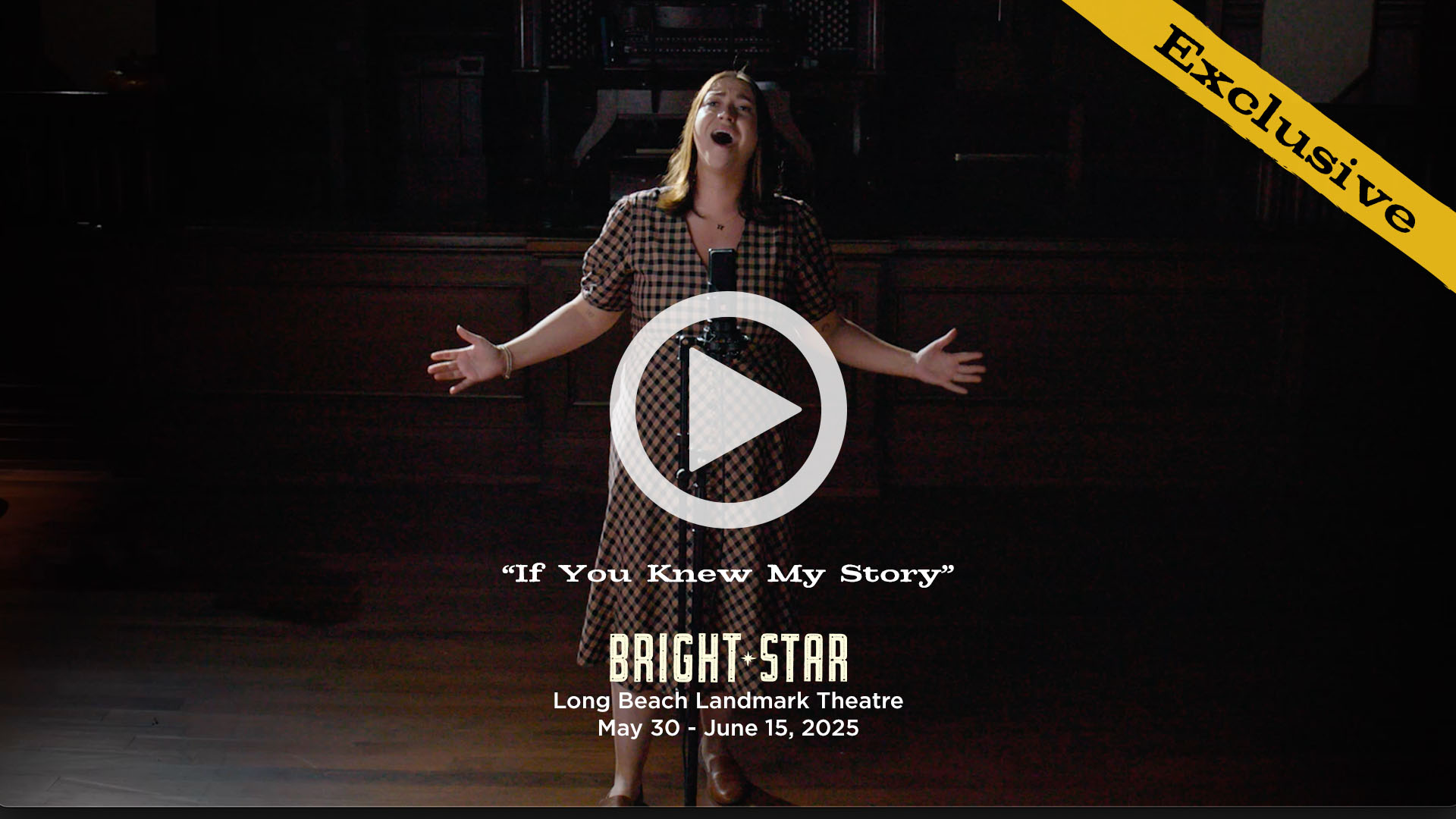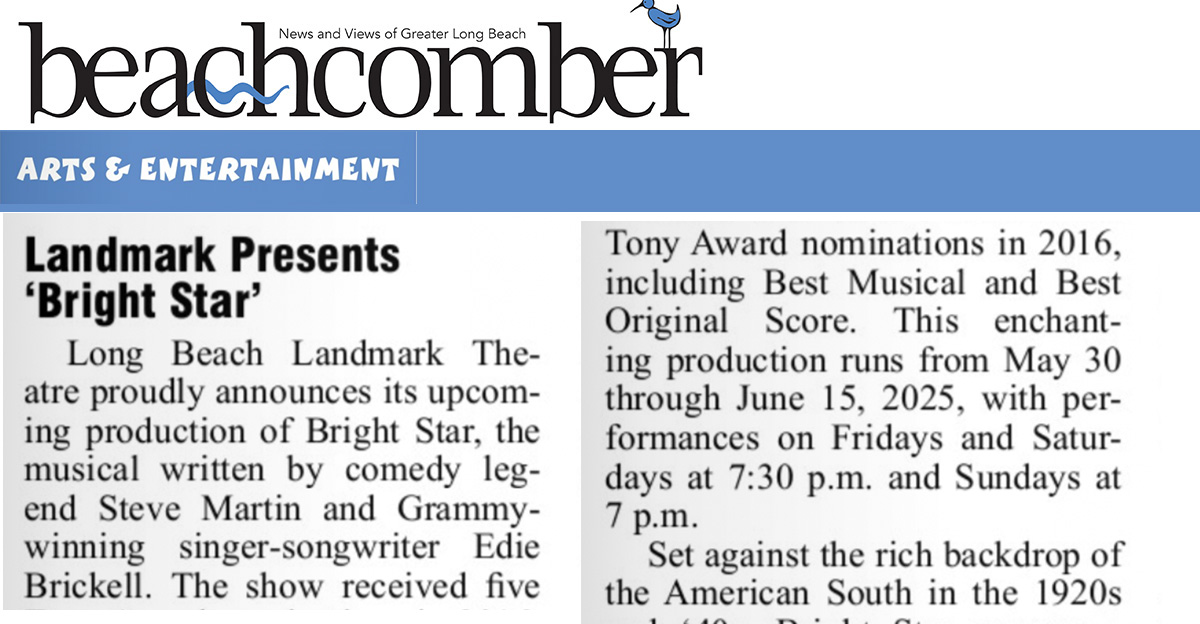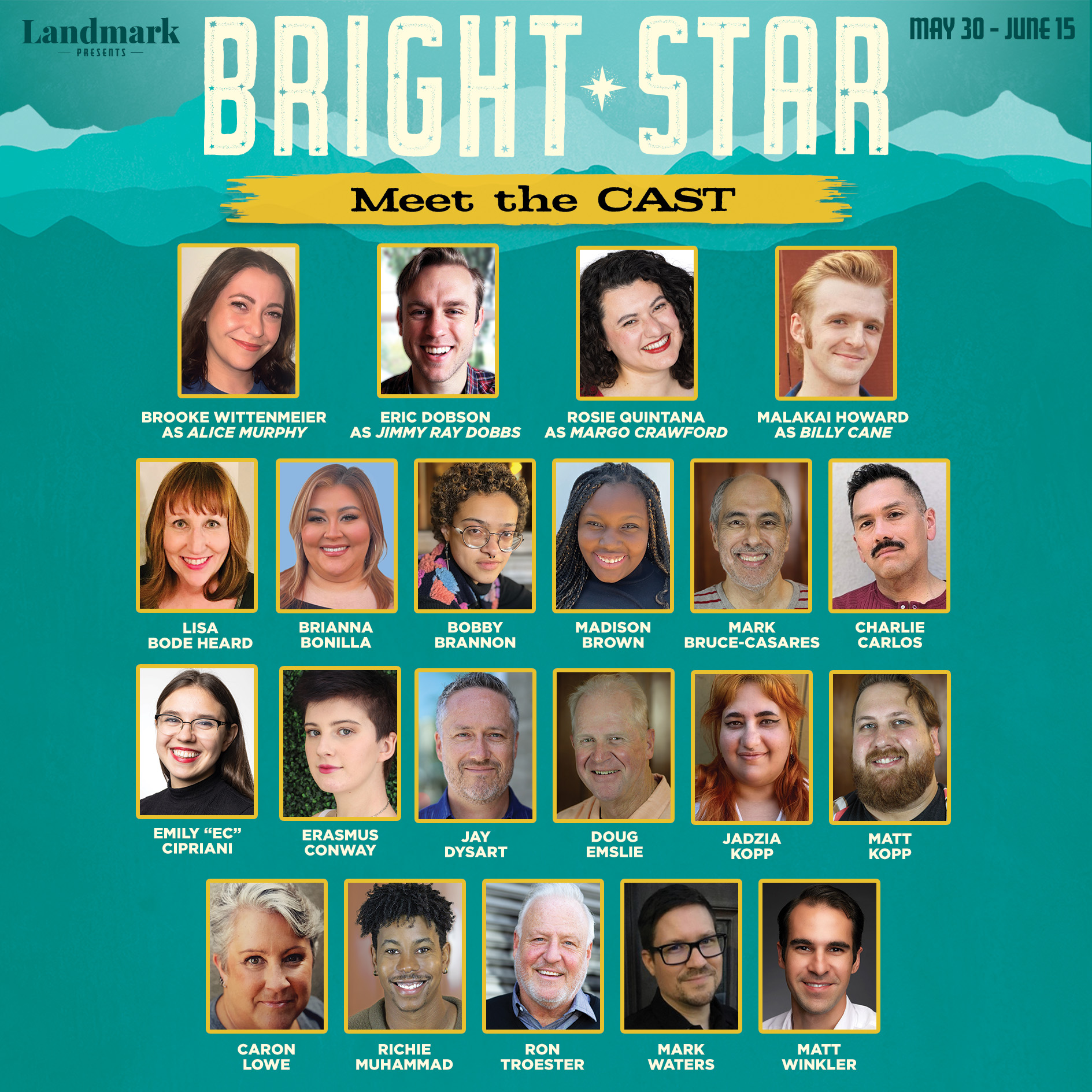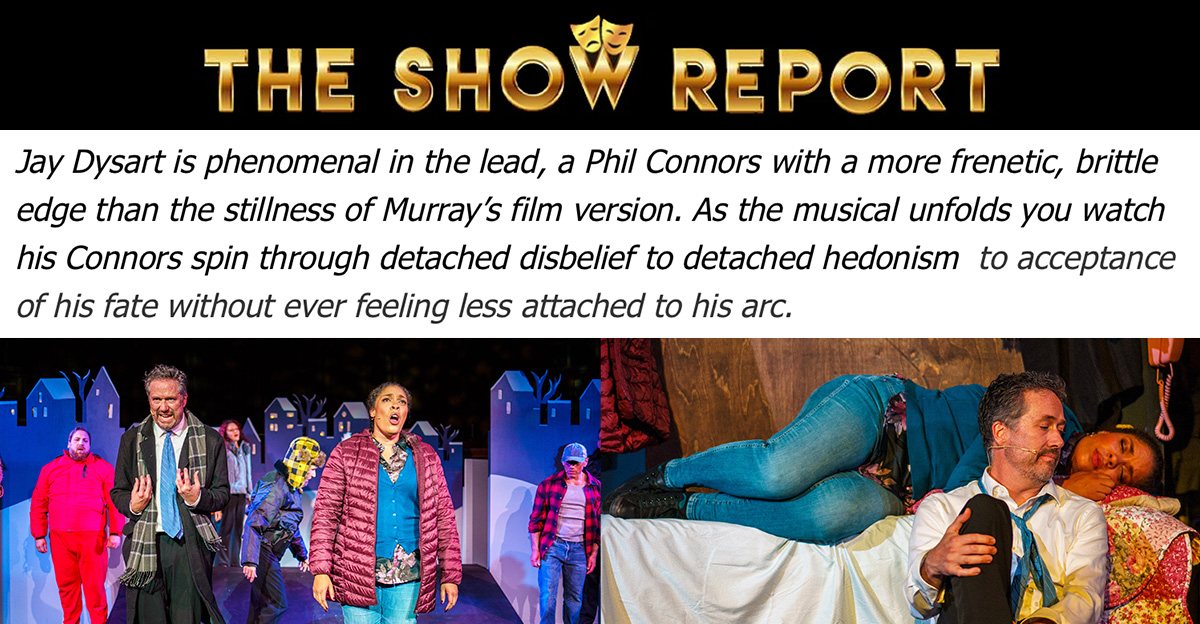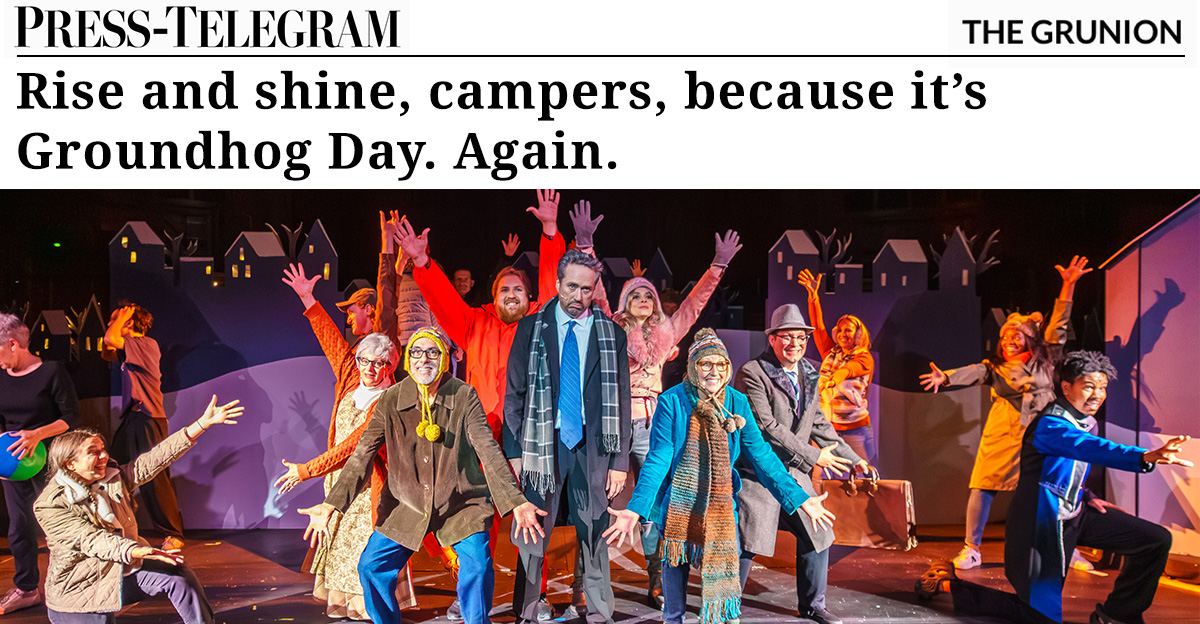Landmark has released the first exclusive Music Video from Bright Star – exclusively for donors to Landmark’s “Watch Landmark” video service. This is Alice Murphy’s song “If You Knew My Story”, sung by Brooke Wittenmeier, and is the first of a series of studio music videos that will be made available on Watch Landmark.
 jloop
jloop
In the News: Bright Star featured in the Beachcomber
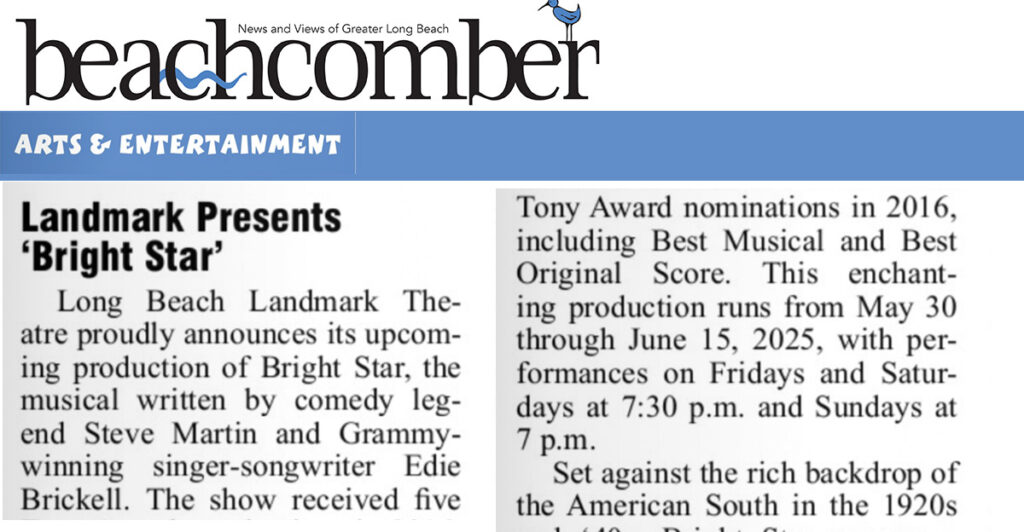
Landmark’s production of Bright Star is featured in The Beachcomber this week.
Under the direction of Megan O’Toole, with musical direction by Curtis Heard, this production features a talented ensemble cast and a full orchestra.
“This production continues our season-long exploration of the unique passage of time and its profound impact on our lives and relationships,” says Artistic Director Megan O’Toole. “Like our breakthrough production of Groundhog Day this fall, Bright Star shows us how the past and present interweave to shape who we become.”
“We’re incredibly excited to share this side of Steve Martin’s artistic range with Long Beach,” adds Producer Jay Dysart. “Many know him as a brilliant comedian, but Bright Star showcases his exceptional gift for storytelling through music.”
Meet the Cast of Bright Star
Landmark is proud to introduce the cast of our Spring main stage musical Bright Star by Steve Martin and Edie Brickell. We could not be more thrilled with the talent that is bursting forth from this incredible ensemble.
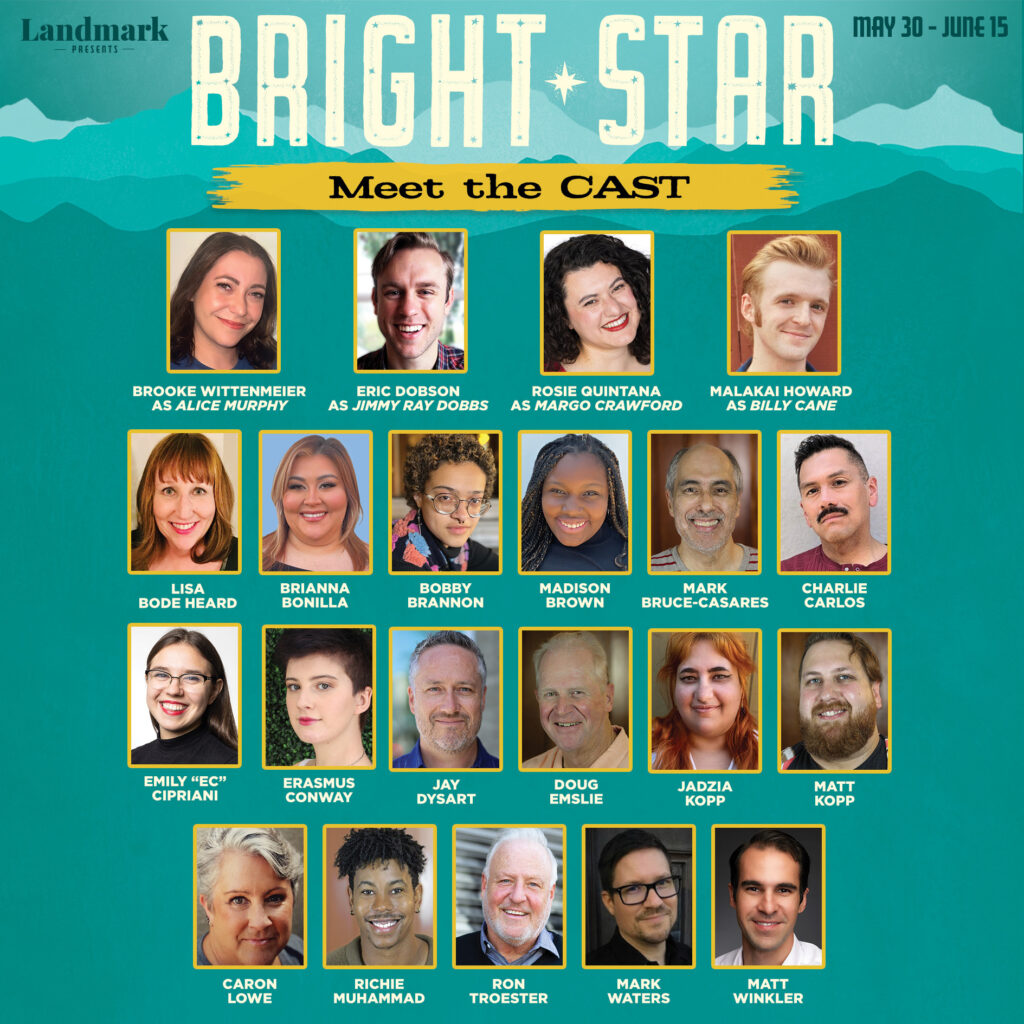
Tickets are on sale now for Bright Star, which opens May 30 and runs for 3 weekends until June 15.
Inspired by a real event and featuring the Tony-Nominated Score by Steve Martin and Edie Brickell, this enchanting musical tells a sweeping tale of love and redemption set against the backdrop of the American South in the 1920s and 40s. This rich tapestry weaves together two chapters in the life of literary editor, Alice Murphy. When Alice meets a young soldier just home from World War II, their unique connection sets her on a journey to understand her past – what she discovers has the power to transform both of their lives.
Landmark announces open call for BRIGHT STAR
Long Beach Landmark Theatre Company is holding open auditions for BRIGHT STAR. Auditions will be held on Mach 8 & 9. All details can be found on the auditions page of the Landmark website.
Book by Steve Martin, Music by Steve Martin and Edie Brickell, Lyrics by Edie Brickell, Conceived by Edie Brickell and Steve Martin
Producer, Jay Dysart; Artistic Director/Stage Director, Megan O’Toole; Musical Director, Curtis Heard
This is a fully staged production, with professional live orchestra.
This is a volunteer theatre performance.
Reimbursement/Per Diem will be offered for all roles.
Anyone interested in receiving notification of auditions with Landmark can sign up here.
REVIEW: “far more than mere nostalgia trip.”
Groundhog Day continues to be the best reviewed show in Landmark’s history, and this latest review from Greggory Moore at Random Lengths News highlights some of our favorite parts about this production. Excerpts below and read the full article online here.

The highlight here is a long sequence near the end of Act 1 starting with “Nobody Cares”, where Phil (Jay Dysart) laments his stuckness to a pair of drunks (Joey Krumbein and Charlie Carlos). Although the conceit of expanding their film roles by giving them a song that fleshes out their backstory is clever in and of itself, the real tickle is getting this tandem show-stopper from a pair of actors we thought were only bit players.
– Random Lengths News
“Nobody Cares” is so good that you’d think there’s no way to keep the momentum, but the ensuing stick-puppet car chase (part and parcel of the mise en scène’s winsome DIY aesthetic) does the job.
– Random Lengths News
Then comes “Strut (Philandering)”, where Phil finds the loop has opened doors for his more ignoble instincts. This may be where director/choreographer Megan O’Toole leaves her most indelible mark. Needless to say, initially establishing Phil’s loop is a relatively simple matter of having everyone around him repeat their lines and blocking verbatim. But once Phil’s attitude changes, O’Toole has everyone around him adapt their repetition as a sort of living objective correlative. Wonderful stuff.
– Random Lengths News
opening night’s biggest laugh was generated by Doug Emslie mugging for a trice before delivering a particular line for the third or fourth time, a wink at the audience showing the actor’s (as opposed to the character’s) consciousness of being stuck in a loop. Hilarious.
– Random Lengths News
Although this is a team win, ya gotta have a strong Phil, and Jay Dysart might’ve won the part on merit even if he weren’t the producer. Especially admirable is his stamina, as from curtain to curtain he brings total energy to whatever the moment requires — comedy, humanity, singing. It’s a task made all the more demanding by the fact that O’Toole’s blocking has Dysart in almost perpetual motion, including during a droll bit of misdirection where he seems to be everywhere at once.
– Random Lengths News
That above-mentioned church, First Congregational, is indeed a Long Beach landmark (in addition to being a “liberal, progressive” haven “welcoming of all” and “passionately committed to social justice,” God bless ‘em) and a helluva unique place to see a show. Not that that matters if the show sucks. But Groundhog Day: The Musical doesn’t. In fact, it’s far more than mere nostalgia trip. If you can’t find a lot to like here, then you’re doing it wrong.
– Random Lengths News
REVIEW: “a joyfully layered production” with “refreshing levity and unexpected depth”
Another incredible review of Groundhog Day: The Musical has landed – this time in the Long Beach Press Telegram and Grunion Gazette. Everyone at Landmark is beyond thrilled with the continued incredible reception that this show has received from both critics and audiences alike. Read excerpts from this review below, and the full article is available online.

Under inspired direction by Megan O’Toole, the production brings refreshing levity and unexpected depth to this tale of self-discovery.
– Sean McMullen, The Press Telegram
Jay Dysart, as Phil, captures the character’s outlandish arrogance and vulnerability with a forceful energy that commands the stage. His performance is, in a word, monumental. Dysart brilliantly traces Phil’s evolution from cynic to sincere, packing an emotional punch into each repeated day, making his journey as fresh and surprising for the audience as if it were their first time.
– Sean McMullen, The Press Telegram
Lauren McGunigale, as Rita, perfectly complements Dysart’s intensity with her gentle yet grounding presence. Her chemistry with Dysart becomes the axis on which the entire show pivots, lending heart to the otherwise campy and comedic storyline. McGunigale’s Rita is an anchor in Phil’s dizzying spiral, bringing out the sincerity behind the slapstick humor. Her role makes us care not just about Phil’s redemption but about the world he grows to appreciate. It’s a delicate balance she handles masterfully.
– Sean McMullen, The Press Telegram
As Ned Ryerson, Mark Waters provides some of the production’s most memorable moments, breathing humor and pathos into the often-overlooked insurance agent.
– Sean McMullen, The Press Telegram
Amanda Webb as Nancy Taylor brings depth to the seemingly vapid small-town dreamer, delivering a powerful solo that highlights the bittersweet hopes of a character often resigned to the background.
– Sean McMullen, The Press Telegram
The director’s vision skillfully marries the zany with the profound, giving the show just the right blend of self-aware theatre gags and meaningful metaphors. By balancing humor with poignant introspection, the production underscores Phil’s transformation, making his journey both amusing and inspiring.
– Sean McMullen, The Press Telegram
The scenic design by Nathan Amondson deserves special praise, as it transforms the historic church’s challenging space into a believable, captivating Punxsutawney.
– Sean McMullen, The Press Telegram
Kudos also to Curtis Heard, who expertly leads the live orchestra in performing Minchin’s musically complex score.
– Sean McMullen, The Press Telegram
And perhaps one of the most fulfilling quotes we’ve heard in recent memory:
With “Groundhog Day” Landmark has found its sunrise—a story full of heart that mirrors its mission to transform and renew the community it serves, day after day.”
– Sean McMullen, The Press Telegram
Groundhog Day runs for two more weekends!
REVIEW: “Good Show! LA Theatre Bites Recommended!”
Another positive review for Groundhog Day from the LA Theatre Bites Podcast. Give the podcast a listen below!
REVIEW: “so outrageously inventive… you can’t wait for another (almost identical) day to dawn.”
An absolutely glowing review from Chris Daniels at THE SHOW REPORT. Read the full review online at theshowreport.org
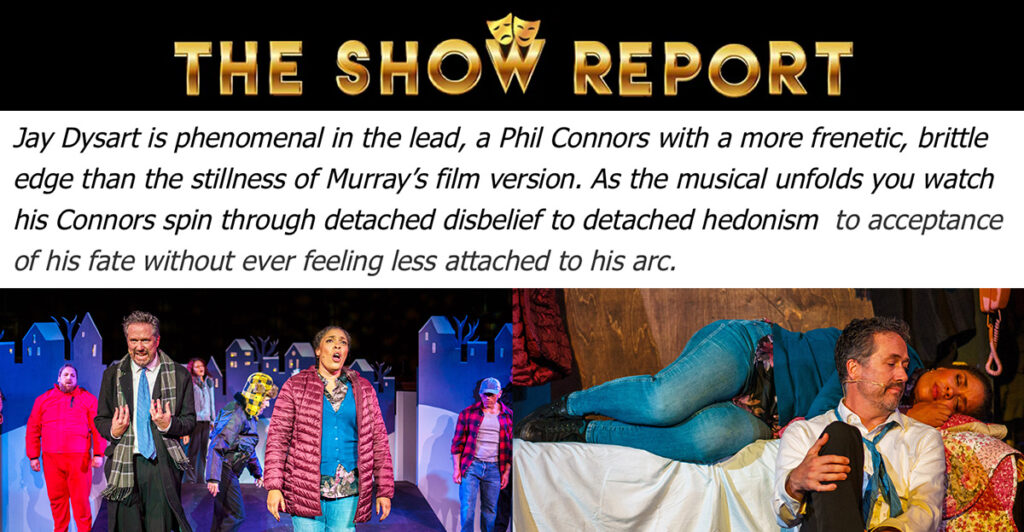
Below are some excerpts from the review:
Jay Dysart is phenomenal in the lead, a Phil Connors with a more frenetic, brittle edge than the stillness of Murray’s film version. As the musical unfolds you watch his Connors spin through detached disbelief to detached hedonism to acceptance of his fate without ever feeling less attached to his arc.
– Chris Daniels, The Show Report
Portraying a man doomed to relive a single day over and over and over again in a small town that becomes his custom-fitted purgatory, Mr. Dysart is so outrageously inventive in ringing changes on the same old, same old, that you can’t wait for another (almost identical) day to dawn.
– Chris Daniels, The Show Report
Phil gradually trades in his cynicism for a grateful acceptance of life’s simpler pleasures. These, of course, include the love of a good woman, who, in this case, is a morally grounded young television producer named Rita Hanson, charmingly embodied and sung by Lauren McGunigale, (last seen in “The Hunchback of Notre Dame”) who provides perfect counterbalance to Phil along with excellent vocals throughout.
– Chris Daniels, The Show Report
It’s Phil’s journey more than his destination that makes GROUNDHOG DAY such joy, as Mr. Dysart gives a many-splendored life to each faltering on the road to self-discovery. Using every tool in the musical theatre arsenal — Anger, prickliness, outrage, wonder, godlike omnipotence, drunken whoopdeedo exhilaration, suicidal angst, Zen-like resignation — Mr. Dysart turns these different feelings into a replete gallery of self-portraits, drawn with both comic spunk and genuine feeling. Even his antic dancing traces a precise evolution of character. And his pliable baritone covers a waterfront of emotions, from sardonic, pattering blitheness (“Small Town, USA”) to heavy-metal despair (the paradoxically titled “Hope”).
– Chris Daniels, The Show Report
the riotous country & western rouser, “Nobody Cares,” in which Phil goes driving drunk with a couple of hilarious barflies (Joey Krumbein; “Rent” and Charlie Carlos; “Titanic The Musical”), becomes an ingeniously staged exercise in hedonistic hopelessness. The choreography to this number is insanely clever — like a bunch of teenage merry prankster theater geeks putting on a high school show. Later, they up the ante on that illusion with a three-dimensional car chase that has to be seen to be believed. It’s like “Avenue Q” meets “The Fast and the Furious.”
– Chris Daniels, The Show Report
thanks to Jay Dysart’s undeniable star power, charisma, and quicksilver stage presence (how does he keep managing to make his way back into that bed without the audience seeing?), this is going to be a show that I suspect will feel totally fresh and new every night.
– Chris Daniels, The Show Report
In the news: Groundhog Day feature in the Press Telegram
Landmark’s production of Groundhog Day has been featured in the Grunion Gazette and Press Telegram with an engaging feature written by Willie Plaschke. Read some quotes below and the full article on the Press Telegram website.

Based on the beloved 1993 film, this beautifully intelligent production will be performed in the sanctuary of the First Congregational Church of Long Beach.
Directed by Megan O’Toole with musical direction by Curtis Heard and produced by Jay Dysart, the musical is led by Dysart himself as Phil Connors, the cynical weatherman caught in a time loop on Feb. 2 during the annual Groundhog Day celebration.
The musical, with music and lyrics by Tim Minchin and book by Danny Rubin (who also wrote the original film’s script), premiered on Broadway in 2017 after a successful run in London’s West End. It received seven Tony Award nominations and won the Olivier Award for Best New Musical in 2017.
So it’s a thrill for this musical to finally be rearing its head in Southern California.
“[Composer and lyricist] Tim Minchin is a marvel,” producing director Jay Dysart said. “His extraordinary, multidisciplinary career definitely put a stamp on Groundhog Day. It’s clear the show is driven by his creative vision.”
This creativity unfolds subtly, but surely, through the musical score: “A tool that Minchin uses in the musical is the concept of Western music itself,” explains Dysart. “When you hear an octave, it’s a musical progression that’s progressing forward, but also returning to its origin.”
– Willie Plaschke, The Press Telegram
The show is not only visually stunning but thematically rich. Once he discovers his motionless predicament, Phil Connors, like his movie counterpart (famously played by Bill Murray), spends a lot of his time trying to manipulate the world around him.
– Willie Plaschke, The Press Telegram
What more could you want out of a night of theater during the closing months of a blustery, mindless, endlessly looping 2024?
– Willie Plaschke, The Press Telegram

